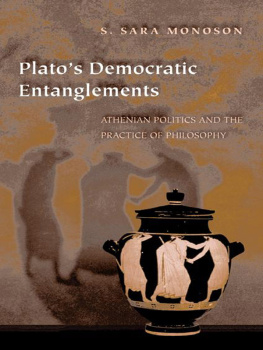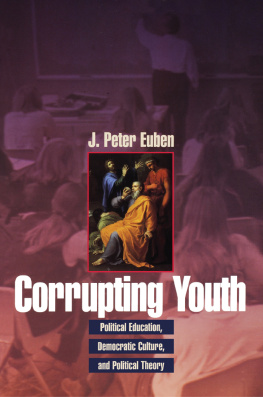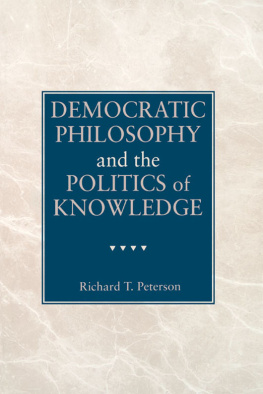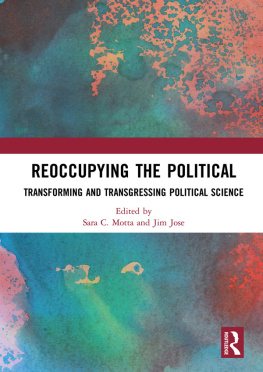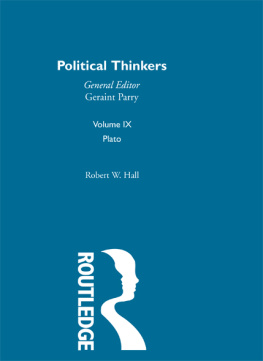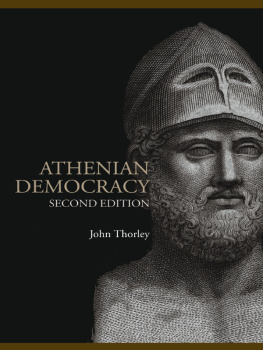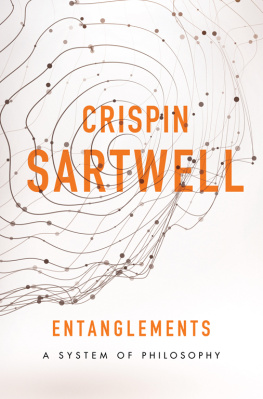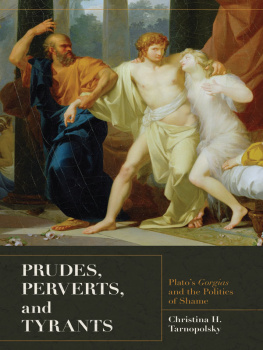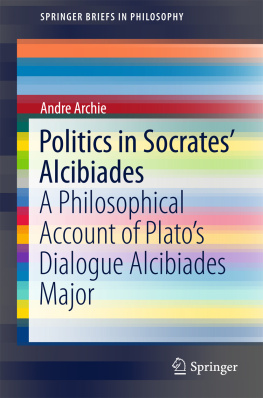
Platos Democratic Entanglements
___________________________
Platos Democratic Entanglements
ATHENIAN POLITICS AND THE PRACTICE OF PHILOSOPHY
S. Sara Monoson
PRINCETON UNIVERSITY PRESS
PRINCETON, NEW JERSEY
Copyright 2000 by Princeton University Press
Published by Princeton University Press, 41 William Street,
Princeton, New Jersey 08540
In the United Kingdom: Princeton University Press,
Chichester, West Sussex
All Rights Reserved
Library of Congress Cataloging-in-Publication Data
Monoson, Susan Sara, 1960
Platos democratic entanglements : Athenian politics and the practice
of philosophy / S. Sara Monoson
p. cm.
Includes bibliographical references and index.
ISBN 0-691-04366-3 (cloth : alk. paper)
1. DemocracyGreeceAthensHistory. 2. Plato
Views on democracy. I. Title
JC75.D36 M65 2000
320.4385dc21 99-054924
This book has been composed in Adobe Galliard
The paper used in this publication meets the minimum requirements
of ANSI/NISO Z39.48-1992 (R1997) (Permanence of Paper)
www.pup.princeton.edu
Printed in the United States of America
1 3 5 7 9 10 8 6 4 2
For Mimi and David Monoson, my wonderful parents
__________________________
ACKNOWLEDGMENTS
_______________________
I OFFER an interpretation of Plato that aims to expose his forging of a serious, though limited, alliance between the practice of philosophy and Athenian democratic politics. This project may seem preposterous to some, intriguing to others, long overdue to others still. I have tried to write with this diverse and multidisciplinary readership in mind.
My approach is contextual. I juxtapose Platos depictions of intellectual labor with contemporaneous demotic forms of civic discourse and the democratic ideals celebrated therein. In so doing, I engage work in Greek historiography and literature by classicists as well as recent scholarship on Platos political thought by theorists and philosophers.
I have relied on Oxford Classical Texts (Oxford: Clarendon) for the Greek text of material cited. I have also regularly consulted the following commentaries: James Adam, The Republic of Plato, Edited with Critical Notes, Commentary and Appendices, 2 vols., 2d ed. (Cambridge: Cambridge University Press, 1963); E. R. Dodds, Plato. Gorgias. A Revised Text with Introduction and Commentary (Oxford: Clarendon, 1959); A. W. Gomme, A Historical Commentary on Thucydides, 5 vols. (vols. 4 and 5 by A. W. Gomme, A. Andrewes, and K. J. Dover) (Oxford: Clarendon, 195081); and P. J. Rhodes, Thucydides Book 2, Edited Greek Text, Translation and Commentary (Warmister: Aris and Philips, 1988). All Greek cited has been transliterated. Note that I have employed ch for chi, x for xi, ph for phi, u for upsilon, for eta, for omega, and i for iota subscript. In the case of well-known names, however, I have retained the customary Latinized spelling (e.g., Socrates, not Sokrates). Unless otherwise noted, translations cited are or derive from the following editions: Allan Bloom, The Republic of Plato. Translation with Notes and Interpretive Essay (New York: Basic, 1968); Terence Irwin, Plato. Gorgias (Oxford: Clarendon, 1979); R. E. Allen, Platos Menexenus, in his The Dialogues of Plato, vol. 1 (New Haven: Yale University Press, 1985), pp. 31543; Thomas Pangle, The Laws of Plato. Translated, with Notes and an Interpretive Essay (New York: Basic, 1980). The remaining texts of Plato cited are from, or are adapted from, those collected in John M. Cooper, ed., Plato: Complete Works, (Indianapolis, Ind.: Hackett, 1997). Translations from Thucydides are from Robert B. Strassler, ed., The Landmark Thucydides: A Revised Edition of the Richard Crawley Translation (New York: Free Press, 1996). Translations from Aristotles Constitution of Athens are from Kurt von Fritz and Ernst Kapp, Aristotles Constitution of Athens and Related Texts. Translated with an Introduction and Notes (New York: Haffner, 1974). Editions of other texts are identified in the notes.
This book began as a doctoral dissertation in the Program in Political Philosophy and Department of Politics at Princeton University. It was my great good fortune to work under the supervision of W. Robert Connor, George Kateb, and Alan Ryan, and to have J. Peter Euben as my outside reader. These teachers, now also friends, have shaped my thinking with probing questions and insightful comments. Each one has my enduring gratitude for his generosity and many kindnesses.
Many other individuals have helped me develop the ideas presented here by offering candid comments on earlier drafts of portions of this work. I have benefited from the exacting standards of Richard Dagger, Tracy Davis, Jill Frank, Bonnie Honig, Richard Kraut, Jenny Mansbridge, Gerald Mara, Susan Moller Okin, Arlene Saxonhouse, Stephen Salkever, Keith Topper, Pierre Vidal-Naquet, and Robert Wallace. Panelists and audiences at meetings of the American Political Science Association, Western Political Science Association, and Northeastern Political Science Association, where I presented various portions of this book over the past few years, were also helpful, as were fellow participants at the conference Democracy and Tyranny in Archaic and Classical Greece at Northwestern University in April 1999. My thanks also to my research assistant, Ella Myers, for her help in proofreading the entire manuscript.
It has also been a pleasure to work with Princeton University Press. For their thoughtful and gracious help at various stages in the preparation of this book, my warm thanks to my editor, Ann Wald, to her assistants, and to Sherry Wert, Jeffrey Carnes, Ian Malcolm, and Karen Verde.
Many colleagues and friends in and out of the Department of Political Science at Northwestern University have been a delight as I have labored to get the book out. My warm thanks in particular to Susan Herbst and the network of women colleagues on whom I have come to rely for frank talk and good cheer. I also recall with pleasure my two years on the faculty in the Department of Political Science at Arizona State University.
Two fellowships provided support at crucial moments in the development of this project. Most recently, I was a Junior Faculty Fellow in the Alice Berline Kaplan Center for the Humanities in Northwestern University. Some years earlier I received a Charlotte Newcombe Dissertation Year Fellowship.
Parts of various chapters have appeared in print: Frank Speech, Democracy and Philosophy: Platos Debt to a Democratic Strategy of Civic Discourse, in Athenian Political Thought and the Reconstruction of American Democracy, ed. J. Peter Euben, Josiah Ober, and John Wallach (Ithaca: Cornell University Press, 1994), pp. 17297, copyright (c) 1994 by Cornell University; Citizen as Erasts: Erotic Imagery and the Idea of Reciprocity in the Periclean Funeral Oration, Political Theory 22, no. 2 (1994): 25376, copyright (c) 1994 by Sage Publications; Remembering Pericles: The Political and Theoretical Import of Platos Menexenus, Political Theory 26, no. 4 (1998): 489513, copyright (c) 1998 by Sage Publications, reprinted by permission.
I have lived with this book for some time and, though in a different way, so has my extended family. All the Monosons, Hochmans, and Gross-mansand in particular, Seth, Jill and Paulinehave displayed an infectious confidence in me that has been a key source of strength. Old friends, too, have sustained me in my labors. In particular, Barrie Place and Vicky Stone have my warmest thanks. To my beloved Michael Berns, whom I met as I was preparing to move to Evanston and who joined me there a few months later, thank you for your patience. To my adored Alexander, know that you inspired my choice of cover art. I have reserved expression of my greatest debt for the dedication.
Next page
